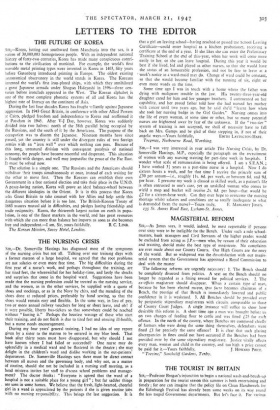LETTERS TO THE EDITOR
THE FUTURE OF KOREA
SIR,—Korea, jutting out southward from Manchuria into the sea, is a nation of 30,000,003 homogeneous people. With an independent national history of forty-two centuries, Korea has made many conspicuous contri- butions to the civilisation of mankind. For example, the world's first movable metal printing types were invented in Korea in 1403, fifty years before Gutenberg introduced printing in Europe. The oldest existing astronomical observatory in the world stands in Korea. The Koreans invented the world's first iron-plated ships, with which they annihilated a great Japanese armada under Shogun Hideyoshi in 1596—three cen- turies before ironclads appeared in the West. The Korean alphabet is one of the most complete phonetic systems of all and Korea has the highest rate of literacy on the continent of Asia.
During the last four decades Korea has fought vr.liantly against Japanese aggression. In 1943 Great Britain, in conference with other Allied Powers at Cairo, pledged freedom and independence to Korea and reaffirmed it at Potsdam in 1945. After V-J Day, however, Korea was suddenly divided into two halves: north of the 38th parallel being occupied by the Russians, and the south of it by the Americans. The purpose of the cccupaticn was to disarm the Japanese. Nineteen months have since passed, yet the country is still under the divergent rules of two foreign armies with an " iron wall " over which nothing can pass. Because of this long, unnatural division with consequent paralysis of national economy, the people have become resentful and desperate. This situation is fraught with danger, and well may jeopardise the peace of the Far East. It must be solved now.
The solution is a simple one. The Russians and the Americans should withdraw their troops simultaneously at once, instead of each waiting for the other to move first. Then the Koreans can establish their own Government in a free national election and take their place in the U.N.O. A peace-loving nation, Korea will prove an ideal balance-wheel between the different ideologies in the Orient. It is in this process that Korea asks Great Britain to take counsel with her Allies and help settle this dangerous situation before it is too late. The British-Korean Treaty of 1883 assures mutual aid in difficulties, and pledges lasting friendship and trade reciprocity. Korea, the thirteenth largest nation on earth in popu- lation, is one of the finest markets in the world, and has great resources with which she can more than balance her imports as soon as she becomes
free and independent—I am, Sir, yours faithfully, B. C. Lusts. The Korean Mission, Savoy Hotel, London.


































 Previous page
Previous page